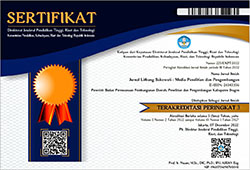FAKTOR SOSIAL DAN DEMOGRAFI YANG BERHUBUNGAN DENGAN PEKERJA LANSIA DI INDONESIA
DOI:
https://doi.org/10.32630/sukowati.v5i2.188Keywords:
working status, elderly worker, social factor, demographic factor, correlationAbstract
Indonesia’s elderly worker increase each year and now is 50th in the world. Increase in the number of elderly people in Indonesia is an indicator of success of development in health sector. Marked by an increase in life expectancy. On the other hand, this is a social and economic burden on the state. We use 65+ years old as border age of elderly in this research. The objectives are to describe the social & demographic characteristic of the elderly worker and to find the correlations among social & demographic factors with working status of elderly worker in Indonesia. The methods are descriptive analysis (frequency and crosstab table) and inferential analysis of correlation (Chi Square test). Majority of elderly worker in Indonesia is women, married, head of household, 65-74 years old, occupied in informal sector, average of working time 34,23 hour per week, had health illness, no social security and debt. Chi square test results show that working status is moderately correlated with ages, sex, marital status, status in the household, and working hour. Then, social security is weak and another factor (education, health illness, debt, and occupation sector) is very weak.
Downloads
Published
How to Cite
Issue
Section
License
Copyright (c) 2021 Yusuf Amri, Rijanta, Umi Listyaningsih

This work is licensed under a Creative Commons Attribution 4.0 International License.


















